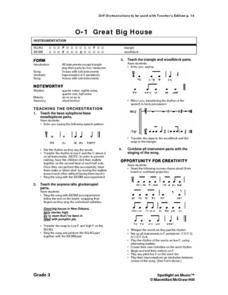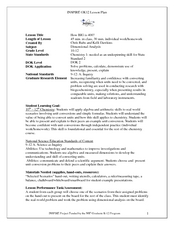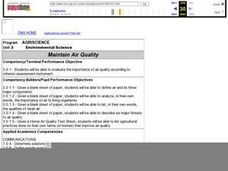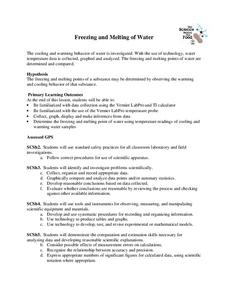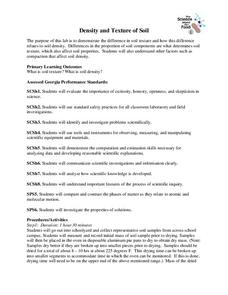Curated OER
Great Big House
Third graders sing and play the song "Great Big House" in the Orff style using soprano and alto glockenspiels, bass xylophones, bass marimbas, triangles, woodblocks, and the singing voice. The lesson includes step-by-step teacher...
Curated OER
Broccoli
Students sing a song and figure out the rhythm notation for pharases while describing the benefits of broccoli. They compose a four-measure pattern using the rhythms of these phrases. They play the rhythm patterns with the recording.
Curated OER
Simple Machines/Technology
Third graders examine the concept of work as the movement of an object through a distance. They define gravity and determine what type of work is caused by gravity. They measure how far an object is moved by a force. They make a...
Curated OER
The Derivation of (Pi)
Seventh graders groups measure the diameter and circumference of each of the circular objects in the room. They record their results on their student worksheets and access a computer spreadsheet program to compile their results.
Curated OER
DESIGN AND BUILD A MAGNETOMETER
Learners brainstorm and design an instrument to detect magnetic field direction. The design approximates the design included in this activity. They build a functioning magnetometer, a device for detecting the relative direction of the...
Curated OER
Making the Changes
Students investigate the two chords of G/F in the 4/4 meter within the acceptable boundaries. They practice listening and performing the chords using the method of improvisation. Students also recognize the relationship of notes and...
Curated OER
Polyrhthm
Fourth graders compose and perform polyrhythms in small groups using non-pitched percussion instruments. They enter the classroom with the recording of "The Rite of Spring" playing on the CD player. Students are asked to describe the...
Curated OER
How BIG is 400?
Students solve problems using dimensional analysis. In this chemistry lesson, students choose a problem and present it in class. The rest of the class will evaluate the solved problem on the board.
Curated OER
Broccoli
Students figure out rhythm notation for phrases describing the benefits of broccoli. They compose four-measure patterns using the rhythms of these phrases.
Curated OER
Temperature Variations and Habitability
Pupils, in groups, evaluate conditions outside the building and inside the classroom using thermometers, barometers, anemometers, etc. They compare interior and exterior conditions. They consider and discuss factors that contribute to...
Curated OER
Maintain Air Quality
Students are engaged in discussing air quality through hands-on demonstrations using balloons, sealed jars, and toy cars. Students conduct a home radon test to measure their air quality.
Curated OER
Hazardous Waste
Students define technology and relate the definition to the production of electricity using nuclear energy. They also list the technologies involved and relate the use of these technologies to their effect on society in general, and...
Curated OER
Skittles and Springs
Students experiment to discover the relationship between the stretch of a spring and the amount of weight attached to the spring using Skittles. They use a CBR and a graphing calculator to gather data.
Curated OER
Moon Journal
Students review the planets and major moons in the Solar System. In groups, they research and describe the various phases of the moon. They record their observations of the moon phases over a specific period of time and use the...
Curated OER
Causes and Effects of Earthquakes and Volcanoes
Tenth graders discuss the techniques and tools scientists use to study about the earth, including techniques used to determine geological time scales. They share their personal experiences of earthquakes and volcanoes.
Curated OER
Which Colors Absorb the Most Energy?
Students measure the temperatures over time of different colored envelopes in order to explore the different rates at which each color absorbs energy from a heat lamp. They record their data and graph their results.
Curated OER
Examining Infiltration Rates of Various Soil Types
Students formulate their own hypothesis, determine which variables are important to test their hypothesis, design an experiment in which they collect data. They utilize instruments and tools to measure, calculate, and organize data.
Curated OER
Capacity Lotto
In this mathematical worksheet, students convert fifteen metric units of capacity and multiply and divide whole numbers by 10, 100 and 1000.
Curated OER
Pulse and Blood Pressure
Sixth graders monitor and record vital signs of fellow classmates. In this vital sign lesson students use medical instruments to measure pulse and blood pressure.
University of Georgia
Energy Content of Foods
Why do athletes load up on carbohydrates the evening before a competition? The lesson helps answer this question as it relates the type of food to the amount of energy it contains. After a discussion, scholars perform an experiment to...
University of Georgia
Freezing and Melting of Water
Examine the behavior of energy as water freezes and melts. An engaging activity provides a hands-on experience to learners. Collaborative groups collect data and analyze the graphs of the temperature of water as it freezes and then...
University of Georgia
Density and Texture of Soil
All soil is not created equal! A lab activity asks learners to collect and analyze soil. Specific calculations determine the amount of sand, silt, and clay in a sample and allow individuals to identify the soil texture.
University of Georgia
Splat!
What does viscosity have to do with splatter? An activity shows that the viscosity of a substance is inversely proportional to the distance of its splatter. Learners conduct the experiment by collecting data, graphing, and analyzing the...


